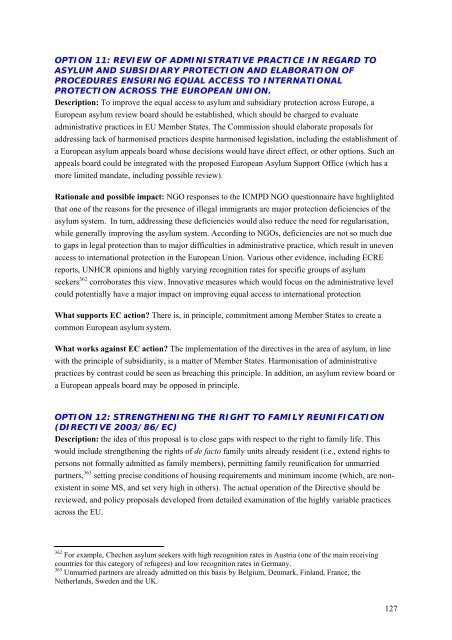REGINE Regularisations in Europe Final Report - European ...
REGINE Regularisations in Europe Final Report - European ...
REGINE Regularisations in Europe Final Report - European ...
Create successful ePaper yourself
Turn your PDF publications into a flip-book with our unique Google optimized e-Paper software.
OPTION 11: REVIEW OF ADMINISTRATIVE PRACTICE IN REGARD TO<br />
ASYLUM AND SUBSIDIARY PROTECTION AND ELABORATION OF<br />
PROCEDURES ENSURING EQUAL ACCESS TO INTERNATIONAL<br />
PROTECTION ACROSS THE EUROPEAN UNION.<br />
Description: To improve the equal access to asylum and subsidiary protection across <strong>Europe</strong>, a<br />
<strong>Europe</strong>an asylum review board should be established, which should be charged to evaluate<br />
adm<strong>in</strong>istrative practices <strong>in</strong> EU Member States. The Commission should elaborate proposals for<br />
address<strong>in</strong>g lack of harmonised practices despite harmonised legislation, <strong>in</strong>clud<strong>in</strong>g the establishment of<br />
a <strong>Europe</strong>an asylum appeals board whose decisions would have direct effect, or other options. Such an<br />
appeals board could be <strong>in</strong>tegrated with the proposed <strong>Europe</strong>an Asylum Support Office (which has a<br />
more limited mandate, <strong>in</strong>clud<strong>in</strong>g possible review).<br />
Rationale and possible impact: NGO responses to the ICMPD NGO questionnaire have highlighted<br />
that one of the reasons for the presence of illegal immigrants are major protection deficiencies of the<br />
asylum system. In turn, address<strong>in</strong>g these deficiencies would also reduce the need for regularisation,<br />
while generally improv<strong>in</strong>g the asylum system. Accord<strong>in</strong>g to NGOs, deficiencies are not so much due<br />
to gaps <strong>in</strong> legal protection than to major difficulties <strong>in</strong> adm<strong>in</strong>istrative practice, which result <strong>in</strong> uneven<br />
access to <strong>in</strong>ternational protection <strong>in</strong> the <strong>Europe</strong>an Union. Various other evidence, <strong>in</strong>clud<strong>in</strong>g ECRE<br />
reports, UNHCR op<strong>in</strong>ions and highly vary<strong>in</strong>g recognition rates for specific groups of asylum<br />
seekers 362 corroborates this view. Innovative measures which would focus on the adm<strong>in</strong>istrative level<br />
could potentially have a major impact on improv<strong>in</strong>g equal access to <strong>in</strong>ternational protection<br />
What supports EC action? There is, <strong>in</strong> pr<strong>in</strong>ciple, commitment among Member States to create a<br />
common <strong>Europe</strong>an asylum system.<br />
What works aga<strong>in</strong>st EC action? The implementation of the directives <strong>in</strong> the area of asylum, <strong>in</strong> l<strong>in</strong>e<br />
with the pr<strong>in</strong>ciple of subsidiarity, is a matter of Member States. Harmonisation of adm<strong>in</strong>istrative<br />
practices by contrast could be seen as breach<strong>in</strong>g this pr<strong>in</strong>ciple. In addition, an asylum review board or<br />
a <strong>Europe</strong>an appeals board may be opposed <strong>in</strong> pr<strong>in</strong>ciple.<br />
OPTION 12: STRENGTHENING THE RIGHT TO FAMILY REUNIFICATION<br />
(DIRECTIVE 2003/86/EC)<br />
Description: the idea of this proposal is to close gaps with respect to the right to family life. This<br />
would <strong>in</strong>clude strengthen<strong>in</strong>g the rights of de facto family units already resident (i.e., extend rights to<br />
persons not formally admitted as family members), permitt<strong>in</strong>g family reunification for unmarried<br />
partners, 363 sett<strong>in</strong>g precise conditions of hous<strong>in</strong>g requirements and m<strong>in</strong>imum <strong>in</strong>come (which, are nonexistent<br />
<strong>in</strong> some MS, and set very high <strong>in</strong> others). The actual operation of the Directive should be<br />
reviewed, and policy proposals developed from detailed exam<strong>in</strong>ation of the highly variable practices<br />
across the EU.<br />
362 For example, Chechen asylum seekers with high recognition rates <strong>in</strong> Austria (one of the ma<strong>in</strong> receiv<strong>in</strong>g<br />
countries for this category of refugees) and low recognition rates <strong>in</strong> Germany.<br />
363 Unmarried partners are already admitted on this basis by Belgium, Denmark, F<strong>in</strong>land, France, the<br />
Netherlands, Sweden and the UK.<br />
127
















